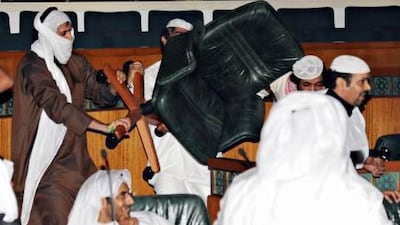KUWAIT CITY // Kuwait's emir yesterday ordered security forces to take all "necessary" steps to maintain security after angry mobs stormed parliament to demand that the prime minister be sacked over graft allegations.
At least five members of the security forces were injured in scuffles with protesters during the clashes on Wednesday night, the interior ministry said in a statement yesterday.
Opposition lawmakers led the thousands of protesters at the National Assembly.
In a statement issued after an emergency cabinet meeting, Sheikh Sabah Al Ahmad Al Jaber Al Sabah "ordered the interior ministry and the national guards to take all measures and preparations necessary to confront whatever undermines the security of the country and public order".
Forces must be given "all authority necessary to ensure security and the application of the law to put an end to such shameful and provocative acts".
No details of the measures to be taken were given nor if any arrests had been made.
Thousands of demonstrators outside the parliament in Kuwait City clashed late on Wednesday with police who beat them with batons, injuring five people, the opposition and witnesses said.
They broke open the parliament's gates before dozens of them entered the main chamber, where they sang the national anthem.
Kuwait's opposition and youth activists have been holding protests for the past few months to press for the removal of the prime minister Sheikh Nasser Mohammad Al Ahmad Al Sabah, a key member of the ruling family.
Kuwait also has been hit by a wave of strikes that grounded the state airline and threatened to disrupt oil shipments.
The clashes came a day after the government and parliament voted against a request by lawmakers to question the prime minister in the assembly. Opposition groups filed another motion to force another debate this month. The opposition wants to question Sheikh Nasser over the alleged transfer of deposits worth about 96 million Kuwaiti dinars (Dh1.28 billion) to bank accounts of MPs considered close to the government.
The opposition and activists accuse the prime minister of corruption. He denies any wrongdoing.
Last month, Kuwait's foreign minister resigned as the scandal grew.
Wednesday evening began with an anti-government rally attended by more than 2,000 Kuwaitis at the Square of Will near parliament. Trouble began when security services prevented a crowd from marching to the prime minister's house.
Several demonstrators were injured. Abdulaziz Al Monayes said he was in the thick of the crowd when the scuffle broke out. He said he was beaten when he got "lost among several cops".
Ali Al Omair, a member of the house who heads an office concerned with parliamentary affairs, called on the interior ministry to prosecute the perpetrators.
A regular session of parliament was cancelled yesterday because of damage to the building, a parliament official said. Sources said protesters broke chairs and equipment in the main hall and tried to force their way into some members' offices.
But opposition lawmaker Mohammed Al Tabtabae said nothing was damaged during the siege "except a cup".
"The guard opened the gate and we got in easily - there was no fighting," said protester Majed Al Mutairi.
"Inside, the MPs talked about the state of the country and told us the chamber belongs to the people.
"We'll do it again if the assembly isn't dissolved and a new election held."
Mohammed Al Al Wuhaib, a teacher of philosophy at Kuwait University, said Kuwaitis have "lost faith" in the assembly because of the corruption scandal. He said the difference between protests in Kuwait and the Arab Spring demonstrations in other parts of the Arab world is that "Kuwaitis are not poor", but they still want a "transparent democratic process".
Lawmaker Musallam Al Barrak, who was pictured inside parliament's main Abdullah Al Salem Hall during the siege, said the event was a "legitimate break-in" led by members of the house.
"This is our assembly and the people's assembly, not the assembly of those who use it to protect their own interests," Mr Al Barrak said. "When the constitution is violated, the people will take their revenge."
Other MPs lambasted the protesters. Salwa Al Jassar called the incursion "a terrorist act and the suicide of democracy".
Opposition MP Mubarak Al Walan said the protesters' actions were "natural in the light of rampant corruption".
After clearing parliament's main hall in the early hours of yesterday morning, hundreds returned to the site of the rally and many threatened to establish a permanent protest. But the demonstrators dissipated throughout the night.
The 71-year-old Sheikh Nasser has been the target of opposition criticism since he was appointed in February 2006, forcing him to resign six times, and dissolving parliament and holding fresh elections three times.
jcalderwood@thenational.ae
* With additional reporting by Agence France-Presse

